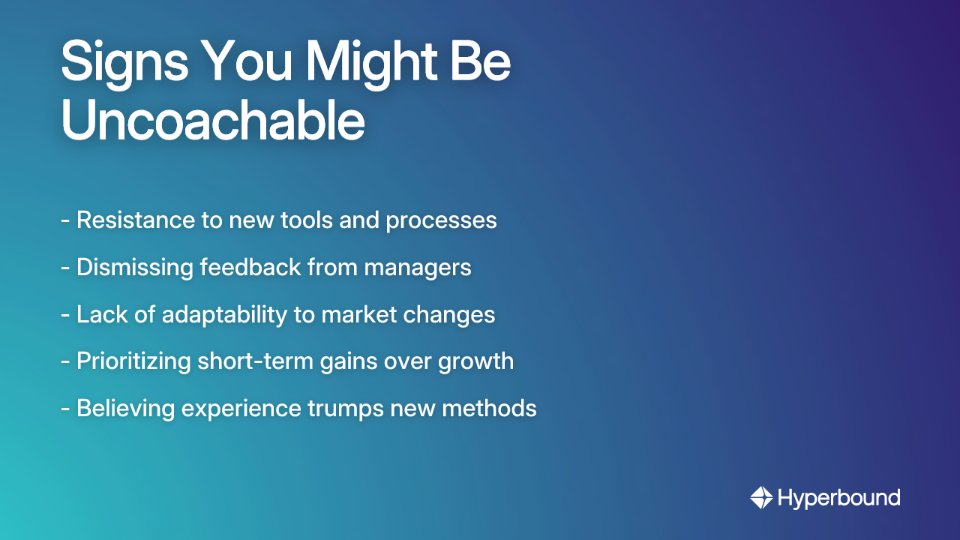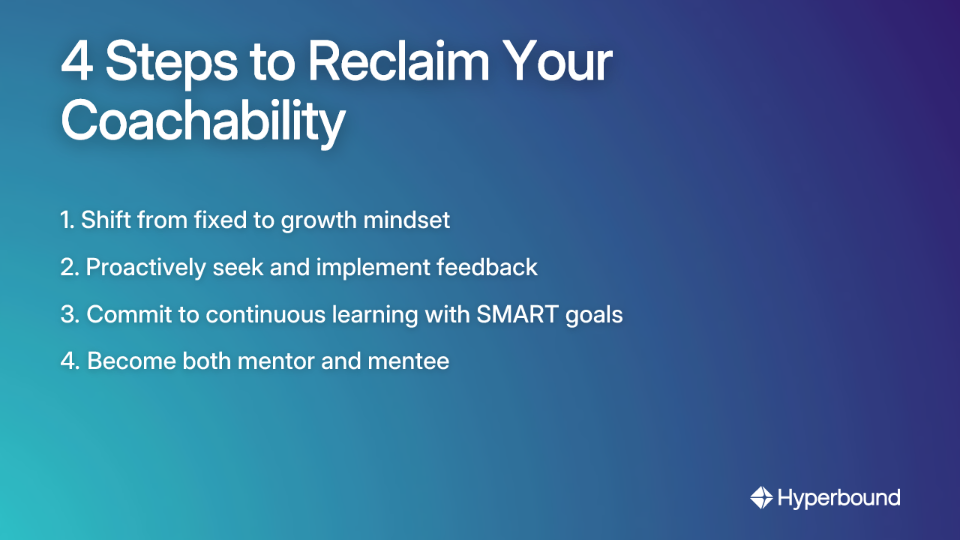
Remember that 'Sales Rep of the Year' plaque from 2014 gathering dust on your shelf? It's a testament to your past glory. But on today's sales floor, is it a badge of honor or a ball and chain?
You've closed deals that newer reps can only dream about. You've weathered market downturns, survived multiple sales VPs, and built a network that took years to cultivate. Your relevant experience is undeniable.
But here's the uncomfortable question: Have you accidentally become the "uncoachable" veteran who is a thorn in your manager's side?
In an economy where companies get 500 resumes in a few days for every Account Executive role, being "experienced" isn't enough anymore. They want experience and coachability. The question is – do you still have both?
The 'Am I Uncoachable?' Self-Assessment Quiz

Before you dismiss this article (which would ironically prove its point), take a moment for some honest self-reflection. How many of these traits sound familiar?
1. Resistance to Change & New Tools
- Do you roll your eyes when a new CRM feature is announced?
- Have you said "My old way works just fine" in the last month?
- Do you find yourself "too busy" to attend training on new sales tools?
When a sales rep is "completely unable or unwilling to learn the tools... it makes managing them very difficult," according to frontline managers. Your refusal to adapt isn't just annoying – it's actively making your manager's job harder.
2. Overconfidence & Dismissing Feedback
- Do you believe your years of success mean there's little a younger manager can teach you?
- When you receive constructive criticism, is your first instinct to dismiss it?
- Do you find yourself saying, "That might work for the new folks, but I don't need that"?
Even high-performing reps can be perceived as uncoachable despite meeting performance targets. Your numbers might be good now, but without adaptability, they won't stay that way forever.
3. Lack of Adaptability
- How do you react when a sales strategy that worked for years suddenly stops yielding results?
- Do you dig in your heels or pivot when market conditions change?
- Are you quick to blame external factors when deals fall through?
Adaptability is crucial for sales success, allowing sales reps to thrive in various situations. It's key to handling rejection with resilience and building stronger client relationships.
4. Prioritizing Income Over Growth
- Are you focused solely on hitting your number to maximize your comp plan?
- Do you view professional development as a waste of time that could be spent closing?
- Do you see hunger for improvement as something only inexperienced reps need?
Some employees prioritize immediate income over personal growth, creating tension with management who need to develop their sales force for the long term.
Why Being 'Uncoachable' Is a Career Killer
If you checked more than a couple of boxes above, it's time for a reality check. Your resistance to coaching isn't just annoying your boss—it's actively hurting your career in ways you might not realize.
You're Leaving Money on the Table
The data doesn't lie: effective sales coaching can lead to a 28% higher win rate and an 88% increase in productivity. By resisting coaching, you're actively hurting your own numbers and commission checks.
Think about it: when was the last time you significantly exceeded your quota? If it's been a while, your stubborn adherence to outdated methods might be to blame.
You're Becoming Irrelevant
The market is changing at lightning speed. Today, 70% of buyers prefer online interactions, and it often takes over 12 attempts to engage a potential buyer. The old-school "three calls and I'm out" approach simply doesn't cut it anymore.
Your industry experience is valuable—until it isn't. When you refuse to update your playbook, you risk becoming the sales equivalent of a flip phone in an iPhone world.
You're Risking Your Job
In today's competitive job market, companies have their pick of talent. Your experience won't save you if you're viewed as a drain on resources and team morale.
According to research, 58% of workers are likely to leave their company if they don't receive professional development opportunities. While you might be resisting development, your company culture is shifting toward continuous learning to retain talent. Guess who becomes expendable in that equation?
You're Damaging Team Morale
Your resistance creates significant headaches for leadership. Leaders often feel helpless when employees resist coaching, according to management discussions. Your attitude can even contribute to high employee turnover and a negative culture, especially when newer team members see your resistance being tolerated.
Personal accountability matters. When you refuse to grow, you're not just hurting yourself—you're poisoning the well for everyone.

The Modern Sales Toolkit You Might Be Ignoring
Adaptability often starts with a willingness to learn new technology. Here are the essential tools that might be revolutionizing your industry while you stick to your outdated methods:
Customer Relationship Management (CRM)
This isn't just a digital rolodex—it's the central nervous system of any modern sales team. Are you fully utilizing all features, or just doing the minimum required data entry?
Purpose: Centralizes sales information, improves communication, and tracks every customer interaction.Examples: Close, Monday, Bigin by Zoho
Sales Automation Tools
Stop wasting time on repetitive tasks that could be automated, giving you more time for actual selling.
Purpose: Automates tasks like email follow-ups and data entry, freeing up time for high-value selling activities.Examples: Zapier, HubSpot, Make
Sales Prospecting Tools
Find leads more efficiently instead of relying solely on networking and referrals.
Purpose: Helps identify, research, and qualify leads at scale.Examples: LinkedIn Sales Navigator, Apollo, Wiza
Analytics Tools
Go beyond your gut feelings to make data-driven decisions.
Purpose: Provides hard data and insights into your sales performance and customer behavior.Examples: ChartMogul, Geckoboard, Rows
Sales Coaching & Enablement Platforms
Practice makes perfect, but only if you're practicing the right things. Modern platforms use AI to analyze real conversations and create a safe space to hone your skills.
Purpose: Provides AI-powered roleplays, call analysis, and personalized feedback to improve sales readiness and execution.Examples: Hyperbound, Gong, Seismic
How many of these tools are you actively using to their full potential? If the answer is "one" or "none," it's time for a change. Being self-sufficient doesn't mean rejecting tools that could make you more effective.
The Comeback Plan: Your 4-Step Guide to Becoming Coachable Again

The good news? It's not too late to change. Here's your roadmap back to relevance:
Step 1: Shift Your Mindset from 'Fixed' to 'Growth'
Adaptability starts in your head. Your mindset fundamentally shapes how you approach challenges and feedback.
Ask yourself these tough questions from adaptability assessments:
- "How do you really feel about change? Why?"
- "Do you enjoy working with different types of people? Give examples."
- "What was the last significant new skill you learned, and how did you approach it?"
The difference between a growth and fixed mindset can determine your future success. A growth mindset sees challenges as opportunities rather than threats to your ego.
Step 2: Proactively Seek and Implement Feedback
Don't wait for your one-on-one. Show initiative by asking your manager, "What's one thing I could do differently this week to be more effective?" This demonstrates proactivity, a highly desired trait in sales professionals.
When receiving feedback, understand the Situation, Behavior, Impact (SBI) model that many managers use. It's not personal; it's a framework for improvement that focuses on specific behaviors rather than your character.
Before a feedback session, use Brené Brown's Engaged Feedback Checklist to ensure you're in the right headspace to listen and learn without defensiveness.
Step 3: Commit to Continuous Learning with SMART Goals
Pick ONE new tool or technique to master this quarter. Don't try to boil the ocean.
Apply the SMART Goals framework:
- Specific: "I will learn to use LinkedIn Sales Navigator to identify 10 new qualified leads per week."
- Measurable: Track the number of leads generated.
- Achievable: Start with a reasonable target.
- Relevant: This will directly impact my pipeline.
- Time-bound: "I will achieve this consistently by the end of the quarter."
Breaking bad habits and forming good habits takes time. Focus on one change at a time to avoid overwhelm.
Step 4: Become a Mentor-Mentee
Leverage your experience by offering to mentor a junior rep on core sales skills. In return, ask them to teach you the new tech stack. This fosters two-way communication and respect.
This approach transforms your experience from a barrier into a collaborative asset. It acknowledges your valuable industry experience while creating space for you to learn without ego.
Evolve or Become a Fossil
This isn't about discarding your valuable experience. It's about augmenting it with new skills and a flexible mindset.
The most powerful sales professionals today have a blend of deep relevant experience and genuine coachability. They understand that past performance doesn't guarantee future results in a rapidly changing marketplace.
The choice is simple: You can be the veteran who complains about the new playbook, or you can be the veteran who helps write the next chapter.
Your legacy isn't defined by the awards on your shelf. It's defined by your willingness to grow, adapt, and lead from the front, no matter how long you've been in your sales role. Choose relevance. Choose personal accountability. Choose to be the veteran that both your team and your manager consider an asset, not a liability.
After all, the most dangerous phrase in business isn't "We're behind quota." It's "We've always done it this way."
Frequently Asked Questions
What does it mean to be an "uncoachable" sales rep?
Being an "uncoachable" sales rep means you are resistant to feedback, new processes, and modern tools, often believing your past experience is all you need. This goes beyond simple disagreement; it's a consistent pattern of dismissing opportunities for growth, which can make you difficult to manage and hinder your long-term success.
Why is being coachable so important if I'm already hitting my sales targets?
Coachability is crucial even for top performers because the market is constantly changing, and what works today may not work tomorrow. While your current methods might be effective now, a lack of adaptability can lead to stagnating performance, making you irrelevant over time. Companies value reps who can evolve with the business for sustained success.
How can I tell the difference between valuable experience and being stuck in my ways?
The key difference lies in your mindset towards new information. Valuable experience is used as a foundation to adapt to new strategies, while being "stuck in your ways" involves rejecting new methods outright. An experienced, coachable rep combines their wisdom with a curiosity to learn, whereas an uncoachable one sees new ideas as a threat to their established methods.
What is the first step I should take to become more coachable?
The first and most critical step is to shift from a fixed to a growth mindset, which means actively choosing to see feedback and challenges as opportunities for improvement. You can start by proactively asking your manager for one specific piece of constructive feedback and making a genuine effort to implement it.
How can modern sales tools help an experienced rep who is already successful?
Modern sales tools are designed to augment your skills, not replace them. They automate repetitive tasks, provide data-driven insights to refine your strategy, and help you connect with more qualified leads efficiently. For an experienced rep, these tools free up time to focus on high-value selling activities, helping you work smarter, not just harder.
Is it ever appropriate to push back on coaching from a manager?
Yes, it can be appropriate to push back on coaching, but it must be done constructively. Instead of dismissing feedback, seek to understand the reasoning behind it by asking clarifying questions. A productive conversation involves sharing your perspective and collaborating on a solution, rather than simply stating, "That won't work." This shows you are engaged, not just resistant.

Book a demo with Hyperbound
.png)













